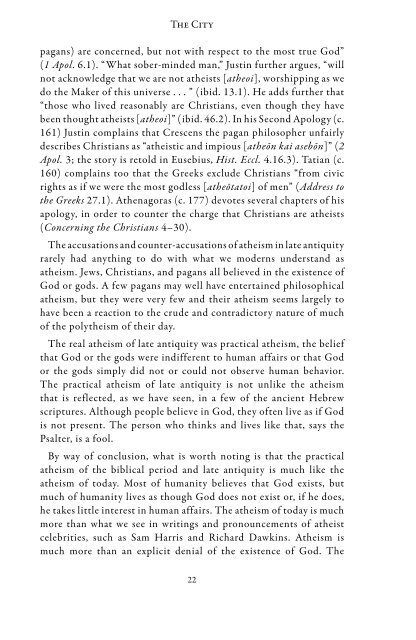THE CITY
h6c7p5d
h6c7p5d
You also want an ePaper? Increase the reach of your titles
YUMPU automatically turns print PDFs into web optimized ePapers that Google loves.
The City<br />
pagans) are concerned, but not with respect to the most true God”<br />
(1 Apol. 6.1). “What sober-minded man,” Justin further argues, “will<br />
not acknowledge that we are not atheists [atheoi], worshipping as we<br />
do the Maker of this universe . . . ” (ibid. 13.1). He adds further that<br />
“those who lived reasonably are Christians, even though they have<br />
been thought atheists [atheoi]” (ibid. 46.2). In his Second Apology (c.<br />
161) Justin complains that Crescens the pagan philosopher unfairly<br />
describes Christians as “atheistic and impious [atheōn kai asebōn]” (2<br />
Apol. 3; the story is retold in Eusebius, Hist. Eccl. 4.16.3). Tatian (c.<br />
160) complains too that the Greeks exclude Christians “from civic<br />
rights as if we were the most godless [atheōtatoi] of men” (Address to<br />
the Greeks 27.1). Athenagoras (c. 177) devotes several chapters of his<br />
apology, in order to counter the charge that Christians are atheists<br />
(Concerning the Christians 4–30).<br />
The accusations and counter-accusations of atheism in late antiquity<br />
rarely had anything to do with what we moderns understand as<br />
atheism. Jews, Christians, and pagans all believed in the existence of<br />
God or gods. A few pagans may well have entertained philosophical<br />
atheism, but they were very few and their atheism seems largely to<br />
have been a reaction to the crude and contradictory nature of much<br />
of the polytheism of their day.<br />
The real atheism of late antiquity was practical atheism, the belief<br />
that God or the gods were indifferent to human affairs or that God<br />
or the gods simply did not or could not observe human behavior.<br />
The practical atheism of late antiquity is not unlike the atheism<br />
that is reflected, as we have seen, in a few of the ancient Hebrew<br />
scriptures. Although people believe in God, they often live as if God<br />
is not present. The person who thinks and lives like that, says the<br />
Psalter, is a fool.<br />
By way of conclusion, what is worth noting is that the practical<br />
atheism of the biblical period and late antiquity is much like the<br />
atheism of today. Most of humanity believes that God exists, but<br />
much of humanity lives as though God does not exist or, if he does,<br />
he takes little interest in human affairs. The atheism of today is much<br />
more than what we see in writings and pronouncements of atheist<br />
celebrities, such as Sam Harris and Richard Dawkins. Atheism is<br />
much more than an explicit denial of the existence of God. The<br />
22


